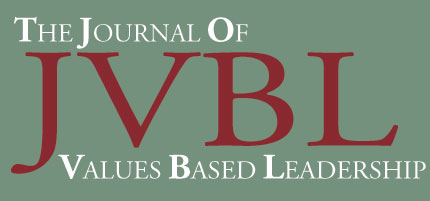- CONTENTS:
- Table of ContentsLetter from the Editor1st Source Bank: A Partner from the Great Depression through the Economic RecessionAuthentic Identity: The Essence of How Successful “Ecopreneurs” CommunicateAccounting Ethics Education: An Authentic Value-Based ApproachValues-Based Leadership and Happiness (Enlightened Leadership Improves the Return on People)The Values-Based RevolutionPower, Responsibility & Wisdom: Exploring the Issues at the Core of Ethical Decision-Making and Leadership
- LETTER FROM THE EDITOR
“We don’t need more regulations; we just need better referees.”
From Atlanta-based Interface, Inc. — a multi-national, billion-dollar industry, previously featured in the third issue of the JVBL — to a community bank with roots in South Bend, Indiana, the message from upper-level management is clear: “We don’t need more regulations; we just need better referees.” Whether or not this is becoming more of a reality may be too premature to assess, however this has become the rallying cry of so many business leaders.
At a time when fiscal uncertainty dominates the marketplace, much of the wrath for this predicament has been directed to the banking industry… with much justification. Institutions like Chase, AIG, CitiBank, and Bank of America conjure up castigating reactions especially when unfathomable, six to seven figure executive bonuses are being planned in the wake of one of the nation’s largest corporate financial rescue. Using the hometown Bailey Savings and Loan portrayed in the iconic film “It’s a Wonderful Life,” bloggers at http://moveyourmoney.info/ as well as reporters from The Huffington Post are calling for citizens to move their money out of the large institutions and into small, community banks. But is this wise — especially at a time when 140 smaller banks have failed and closed their doors in less than two years? And why should smaller banks be trusted in the first place?
One home-grown, family-owned bank has managed to rise above the pack to become recognized as a leading, smaller financial institution by following a course of principled motives and good financial common sense. First (1st) Source Bank is featured in the opening article which details how a little known investment company grew from the ashes of the Civil War, survived the Great Depression, and through the most recent recession was named as one of America’s “100 Most Trustworthy Public Companies” by Forbes and Audit Integrity from among more than 12,000 publically traded companies and thirtieth among the nation’s “Top Performing Banks” by Bank Director Magazine.
The next submission emanates from Canada. With the world turning its attention to the slopes of Vancouver, British Columbia for the 21st Winter Olympic Games, this city has also been in the spotlight for its progressively-minded business innovators and entrepreneurs. Chantal B. Schauch, Founder and President of Vancouver-based ImmerseUs Communications, has successfully morphed the traditional concept of business entrepreneur with the modern-day ecologist, ultimately identifying the key characteristics of the “ecopreneur.” Ecopreneurs embrace a sense of what is right as part of their moral psyche which guides how they live, work, and interact. She admonishes companies to measure their impact by applying “triple bottom line” metrics – anything else will inevitably result in wasted opportunities and disregard of stakeholders.
With the matriculation of students into business schools, many will inevitably select Accounting as their primary field of concentration while others will simply be exposed to its fundamentals. Regardless, the oft-referenced “numbers” major is not and should not be immune to the study and incorporation of ethics. Dr. Otto H. Chang, Dean of the Richard T. Doermer School of Business and Management Sciences in Fort Wayne, Indiana, writes that the mainstream, neo-classic theory used in accounting instruction possesses an inherent assumption that all decision-makers are selfish opportunists. In this manner, the theory actually glorifies and reinforces ego-centrism for students who are learning to make the right decisions in various scenarios. It promotes a self-centered values system which eschews consideration for others. Instead, as Chang admonishes, individuals must be taught that they will be held accountable — not only for the pursuit of their private interests — but for the more comprehensive private good.
Recently, much has been written about how the fiduciary duties owed to a company’s shareholders have expanded to include social responsibility concerns and environmental stewardship to the larger, more encompassing stakeholder population. In any given business, employees are key stakeholders. During the past century, labor and management have frequently been at odds with one another, frequently resulting in work stoppages, strikes, and the enactment of a plethora of laws — all creating varying degrees of conflict and ill will. Charles Millick, business professor, entrepreneur, engineer, and consultant focuses his research upon the emerging role of the co-managerial employee and the erosion of a more regimented workforce hierarchy. Recognizing and utilizing the strengths of the employee without continuing a disingenuous notion of “climbing the corporate ladder” has produced greater worker participation at all levels of decision-making as well as generated a sense of pride and self-confidence – an intangible award much more valuable than power, prestige, and reputation.
This sense of reshaping industry and identifying its larger role in society takes on a new dimension from one noted researcher emanating from the United Kingdom. Dr. Bruce Lloyd of the London South Bank University explores the proper interaction and balancing of Power — which is ostensibly the force which makes things happen — and Responsibility in business decision-making. The wise exercise of striking an appropriate balance between Power and Responsibility is what helps ensure that as many “good” things happen as is possible.
Lastly, entrepreneur and small sustainable business consultant, David Brauer, argues that simply incorporating an environmental vision in strategic management operations — better known as the “Green to Gold” phenomenon — is not necessarily a guarantee of success. Rather, the entrepreneur must embrace the values-based revolution which is permeating the corporate world and is premised upon the principle that consumers will purchase products and services from organizations that share values in synchronization with their own principles.
— Elizabeth Reiner Gingerich , J.D., Editor

